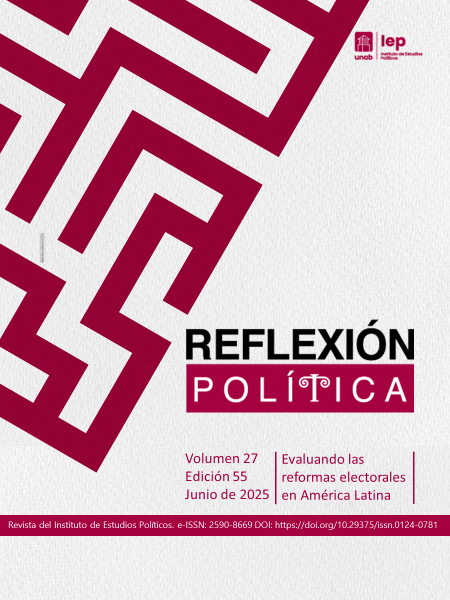Ni descentralización, ni voto obligatorio: la representación política de las mujeres en los gobiernos regionales chilenos
Resumen
Este estudio analiza la representación de las mujeres en los gobiernos regionales de Chile (elecciones 2021-2024). Aunque la proporción de candidatas creció ligeramente tras la elección directa de autoridades y el voto obligatorio, en 2024 no se eligió a ninguna mujer. Los hallazgos confirman que, sin reglas de paridad que aseguren una oferta equilibrada de candidaturas, la descentralización reproduce las barreras partidarias y territoriales que restringen el acceso de las mujeres al poder subnacional.
Referencias bibliográficas
Atria, F. (2014). La Constitución tramposa. LOM Ediciones.
Bardall, G., Bjarnegård, E., & Piscopo, J. M. (2020). How is political violence gendered? Disentangling motives, forms, and impacts. Political Studies, 68(4), 916-935. https://doi.org/10.1177/0032321719888851
Bargsted, M., & González-Ide, A. (2024). Social trust and the winner-loser gap. Electoral Studies, 92, 102869. https://doi.org/10.1016/j.electstud.2024.102869
Bejarano, C. E. (2013). The Latina Advantage: Gender, Race, and Political Success. University of Texas Press.
Biblioteca del Congreso Nacional (2017). Ley N° 21.073 que regula la elección de gobernadores regionales. https://www.bcn.cl/leychile
Birch, S. (2016). Participación plena: un estudio comparativo del voto obligatorio. En Participación plena. Manchester University Press.
Došek, T. (2024). The Persistence of Local Caudillos in Latin America: Informal Political Practices and Democracy in Unitary Countries. University of Pittsburgh Press. https://doi.org/10.2307/jj.14170615
Eizaguirre, M. V. (2024). Midiendo la desigualdad de género en política a nivel subnacional: la propuesta del Índice Subnacional de Derechos Políticos de las Mujeres (ISDPM). Reflexión Política, 26(53), 118-133. https://doi.org/10.29375/01240781.4983
Franceschet, S., Krook, M. L., & Piscopo, J. M. (2012). The impact of gender quotas. Oxford University Press. https://doi.org/10.1093/acprof:oso/9780199830091.001.0001
Franceschet, S., & Thomas, G. (2016). Resisting parity: Gender and political inclusion in Latin America. En G. Waylen (Ed.), Gender and Informal Institutions (pp. 75-98). Palgrave Macmillan.
Freidenberg, F. y Gilas, K. (2020). ¡Ellas tienen los escaños, ellos el poder! Representación legislativa de las mujeres en el estado de Morelos. Revista mexicana de ciencias políticas y sociales, 65 (240), 327-358. https://doi.org/10.22201/fcpys.2448492xe.2020.240.72869
Freidenberg, F. (2021, 10 de marzo). El género en el estudio de los partidos políticos: enfoques, dimensiones de análisis y estrategias metodológicas. Observatorio de Reformas Políticas de América Latina. https://doi.org/10.6084/m9.figshare.14188337
Freidenberg, F. (2021). La representación política de las mujeres en América Latina: estrategias institucionales, actores críticos y reformas pendientes. En E. Rodríguez (Ed.), Perspectivas de América Latina. Hacia un nuevo contrato social tras la COVID (pp. 47-68). Fundación Pablo Iglesias.
Giraudy, A., Moncada, E., & Snyder, R. (2019). Subnational research in comparative politics: Substantive, theoretical, and methodological contributions. En A. Giraudy, E. Moncada, & R. Snyder (Eds.), Inside Countries: Subnational Research in Comparative Politics (pp. 3-52). Cambridge University Press. https://doi.org/10.1017/9781108678384
Harbers, I., & Steele, A. (2020). Subnational variation across states: A typology and research agenda. Latin American Politics and Society, 62(3), 1-18. https://doi.org/10.1017/lap.2020.4
Hinojosa, M. (2012). Selecting Women, Electing Women: Political Representation and Candidate Selection in Latin America. Temple University Press.
Hinojosa, M., & Franceschet, S. (2012). Separate but not equal: The effects of municipal electoral rules on women’s representation in Chile. Political Research Quarterly, 65(4), 758-770. https://doi.org/10.1177/1065912911427449
Hinojosa, M., & Piscopo, J. M. (2013). Promoting women’s right to be elected: Electoral law reforms and candidate gender quotas in Latin America. The Journal of Latin American Politics and Society, 55(3), 32-55.
Hinojosa, M., & Piscopo, J. M. (2018). Women's representation in subnational governments: Decentralization and gender politics in Latin America. Latin American Politics and Society, 60(2), 1-25.
Hinojosa, M., & Piscopo, J. M. (2022). Women’s representation in Latin America: Advances, challenges, and research frontiers. Politics & Gender, 18(2), 370-393.
Htun, M., & Piscopo, J. M. (2018). Women in politics and policy in Latin America and the Caribbean. United Nations Development Programme.
Jones, M. P., Alles, S., & Tchintian, C. (2012). Cuotas de género, leyes electorales y elección de legisladoras en América Latina. Revista de Ciencia Política, 32(2), 331-357. https://doi.org/10.4067/S0718-090X2012000200001
Krook, M. L. (2010). Quotas for women in politics: Gender and candidate selection reform worldwide. Oxford University Press. https://doi.org/10.1093/acprof:oso/9780195375671.001.0001
Krook, M. L., & O’Brien, D. Z. (2012). All the president’s men? The appointment of female cabinet ministers worldwide. The Journal of Politics, 74(3), 840-855. https://doi.org/10.1017/S0022381612000382
Krook, M. L. (2023). Civic Engagement as a Political Scientist: Tackling Violence against Women in Politics. Politics & Gender, 19(3), 935-937.
Lijphart, A. (1997). Unequal participation: Democracy’s unresolved dilemma. American Political Science Review, 91(1), 1-14. https://doi.org/10.2307/2952255
Molina Figueroa, X. V. (2024). Ladronas de candidaturas, floreros en la dirigencia y culpables por las derrotas: el régimen de género en la vida interna de los partidos políticos mexicanos. Universidad Nacional Autónoma de México.
Palinkas, L. A., Horwitz, S. M., Green, C. A., Wisdom, J. P., Duan, N., & Hoagwood, K. (2015). Purposeful sampling for qualitative data collection and analysis in mixed method implementation research. Administration and Policy in Mental Health and Mental Health Services Research, 42(5), 533-544. https://doi.org/10.1007/s10488-013-0528-y
Piscopo, J. M. (2015). States as gender equality activists: The evolution of quota laws in Latin America. Latin American Politics and Society, 57(3), 27-49. https://doi.org/10.1111/j.1548-2456.2015.00278.x
Piscopo, J. M. (2016). When informality advantages women: Quotas and candidate selection in Mexico. Government and Opposition, 51(3), 487-512. https://doi.org/10.1017/gov.2016.11
Piscopo, J. M., & Krook, M. L. (2020). Power, violence, and representation: The case of women in politics. Politics & Gender, 16(1), 1-27.
Piscopo, J. M. (2020). Women leaders and pandemic performance: A spurious correlation. Politics & Gender, 16(4), 951-959. https://doi.org/10.1017/S1743923X20000525
Piscopo, J. M., & Suárez-Cao, J. (2024). New institutions, new actors, new rules: Gender parity and feminist constitution writing in Chile. European Journal of Politics and Gender, 1-21. https://doi.org/10.1332/25151088Y2023D000000015
Pitkin, H. F., & Romero, R. M. (1985). El concepto de representación. Centro de Estudios Constitucionales.
Programa de las Naciones Unidas para el Desarrollo (PNUD) (2018). Género en cifras: Avances y desafíos de la paridad en Chile. PNUD.
Programa de las Naciones Unidas para el Desarrollo (PNUD) (2022). Informe sobre desarrollo humano: Participación política y voto obligatorio en Chile. PNUD.
Schwindt-Bayer, L. A. (2018). Political Power and Women’s Representation in Latin America. Oxford University Press. https://doi.org/10.1093/acprof:oso/9780199731954.001.0001
Servicio Electoral de Chile (Servel) (2021). Elecciones de Gobernadores Regionales 2021. Servel. https://www.servel.cl
Servicio Electoral de Chile (Servel) (2024). Elecciones de Gobernadores Regionales 2024. Servel. https://www.servel.cl
Snyder, R. (2001). Scaling down: The subnational comparative method. Studies in Comparative International Development, 36(1), 93-110. https://doi.org/10.1007/BF02687586
Subsecretaría de Desarrollo Regional y Administrativo (Subdere) (2020). Rol y funciones de los gobiernos regionales y consejeros regionales. Subdere.
Suárez-Cao, J. (2021). Reconstruyendo la legitimidad tras la crisis: el camino chileno hacia una nueva constitución. Revista de La Haya sobre el Estado de Derecho, 13(2), 253-264.
Suárez-Cao, J., Batlle, M., & Wills-Otero, L. (2017). El auge de los estudios sobre la política subnacional latinoamericana. Colombia Internacional, (90), 15-34. https://doi.org/10.7440/colombiaint90.2017.01
UN Women (2020). Women’s political participation: Africa Barometer. United Nations Entity for Gender Equality and the Empowerment of Women.
Vargas, V., & Wieringa, S. (1998). The triangle of empowerment: Processes and actors in the making of public policy. En G. Lycklama à Nijeholt, V. Vargas, & S. Wieringa (Eds.), Women's Movements and Public Policy in Europe, Latin America, and the Caribbean (pp. 3-23). Garland Publishing. https://doi.org/10.4324/9781315051369-1
Descargas
Derechos de autor 2025 Reflexión Política

Esta obra está bajo una licencia internacional Creative Commons Atribución-NoComercial-SinDerivadas 4.0.
| Estadísticas de artículo | |
|---|---|
| Vistas de resúmenes | |
| Vistas de PDF | |
| Descargas de PDF | |
| Vistas de HTML | |
| Otras vistas | |
























